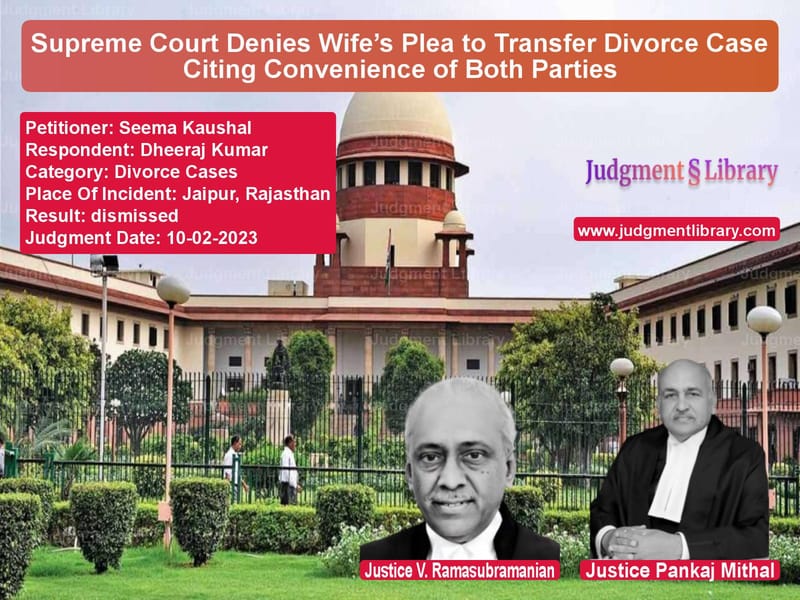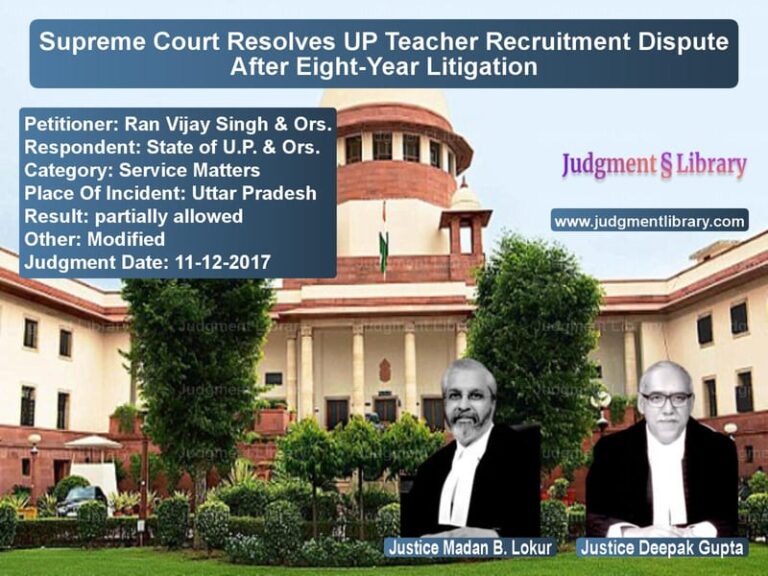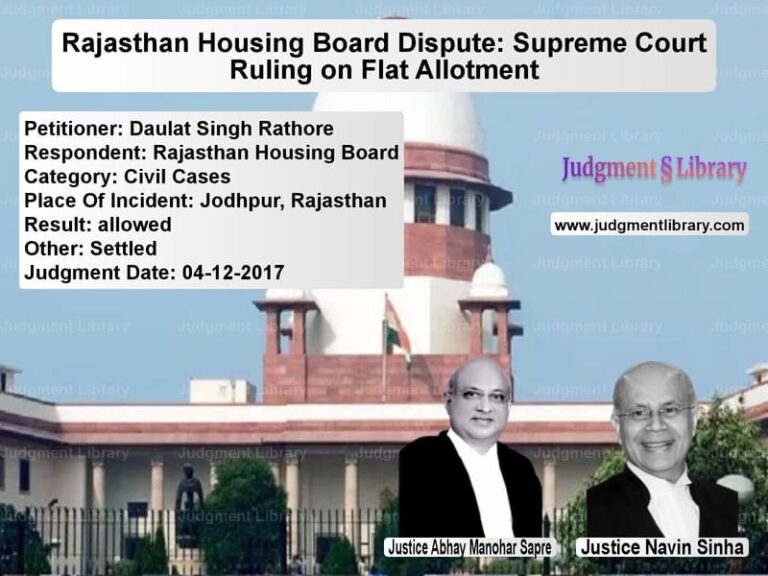Supreme Court Denies Wife’s Plea to Transfer Divorce Case Citing Convenience of Both Parties
The Supreme Court recently ruled on a transfer petition in the case of Seema Kaushal vs. Dheeraj Kumar, where the petitioner sought to transfer a divorce petition from Jaipur, Rajasthan, to Kurukshetra, Haryana. The case sheds light on the considerations courts take into account when deciding transfer petitions, especially in matrimonial disputes.
Background of the Case
The petitioner, Seema Kaushal, and the respondent, Dheeraj Kumar, were married on November 13, 2014, and their marriage was registered in Ghaziabad, Uttar Pradesh. The couple has a son who currently resides with his maternal grandparents in Kurukshetra, Haryana.
Both the petitioner and the respondent are government employees posted in Jaipur. The petitioner, a Class-I officer in the Rajasthan Civil Services, is currently working as a Deputy Director in the National Health Mission, Jaipur. The respondent, her husband, also resides in Jaipur and has filed a divorce petition in Family Court No. 1, Jaipur Metropolis.
Petitioner’s Arguments
The petitioner sought the transfer of the divorce case from Jaipur to Kurukshetra, Haryana, on the following grounds:
“The father-in-law of the petitioner, a retired Assistant Superintendent of Police, is an influential person in Jaipur and has been using his influence to intimidate her. She has received threats at his behest, making it unsafe for her to attend court proceedings in Jaipur.”
The petitioner also stated that their son is studying in Kurukshetra, and she has initiated maintenance proceedings against her husband under Section 125 of the Code of Criminal Procedure, 1973, in the Family Court at Kurukshetra.
Respondent’s Arguments
The respondent opposed the transfer petition, arguing:
“Both parties are residing in Jaipur, and the petitioner continues to work there. There is no reasonable ground for shifting the divorce proceedings to Kurukshetra, which would cause inconvenience to both parties.”
The respondent also pointed out that the complaints about threats were made after the divorce petition was filed and could be an attempt to fabricate grounds for seeking a transfer.
Supreme Court’s Observations
The Supreme Court carefully examined the petitioner’s claims and made the following key observations:
- The petitioner’s father-in-law, though previously an Assistant Superintendent of Police, is now retired. There is no direct evidence that he continues to hold influence over judicial proceedings in Jaipur.
- The petitioner’s allegations of threats do not justify a transfer of the case. If there are genuine concerns for her personal security, the appropriate legal remedy would be to seek protection from law enforcement authorities, not a transfer of the case.
- The initiation of maintenance proceedings in Kurukshetra happened after the divorce petition was filed in Jaipur. The Court noted that this sequence of events suggests a possible afterthought rather than a genuine reason to transfer the case.
- Since both the petitioner and the respondent reside and work in Jaipur, transferring the case to Kurukshetra, which is a considerable distance away, would cause inconvenience to both parties.
Final Judgment
The Supreme Court ruled that the divorce petition should remain in Jaipur, stating:
“In the overall facts and circumstances, we do not deem it necessary to transfer this divorce application. The petition is dismissed. No order as to costs.”
With this decision, the Court upheld the principle that transfer petitions in matrimonial cases should be granted only when there is substantial justification. Mere inconvenience or allegations unsupported by strong evidence are insufficient to warrant such a move.
Implications of the Judgment
This judgment reinforces several legal principles:
- Balance of Convenience: The Court considers the convenience of both parties before deciding on a transfer petition.
- Genuine Grounds: Allegations of threats or influence must be backed by credible evidence.
- Sequence of Legal Proceedings: If one party initiates proceedings in a different jurisdiction after the main case is filed, courts may view it as a tactical move rather than a genuine necessity.
Conclusion
The Supreme Court’s ruling in Seema Kaushal vs. Dheeraj Kumar serves as a significant precedent in transfer petitions related to matrimonial disputes. The judgment underscores that a case should generally be heard in the jurisdiction where both parties reside, unless compelling reasons justify a transfer. This decision ensures that judicial proceedings remain fair and are not unduly influenced by tactical litigations.
Petitioner Name: Seema Kaushal.Respondent Name: Dheeraj Kumar.Judgment By: Justice V. Ramasubramanian, Justice Pankaj Mithal.Place Of Incident: Jaipur, Rajasthan.Judgment Date: 10-02-2023.
Don’t miss out on the full details! Download the complete judgment in PDF format below and gain valuable insights instantly!
Download Judgment: seema-kaushal-vs-dheeraj-kumar-supreme-court-of-india-judgment-dated-10-02-2023.pdf
Directly Download Judgment: Directly download this Judgment
See all petitions in Mutual Consent Divorce
See all petitions in Alimony and Maintenance
See all petitions in Child Custody
See all petitions in Judgment by V. Ramasubramanian
See all petitions in Judgment by Pankaj Mithal
See all petitions in dismissed
See all petitions in supreme court of India judgments February 2023
See all petitions in 2023 judgments
See all posts in Divorce Cases Category
See all allowed petitions in Divorce Cases Category
See all Dismissed petitions in Divorce Cases Category
See all partially allowed petitions in Divorce Cases Category







